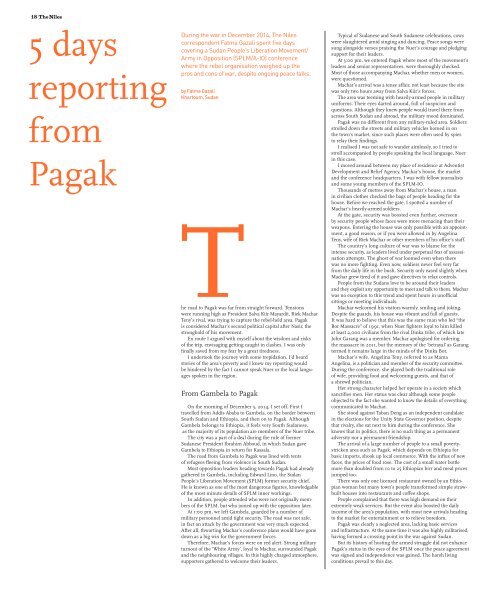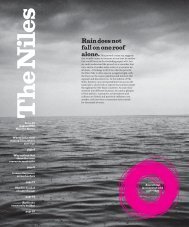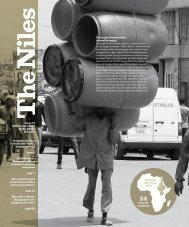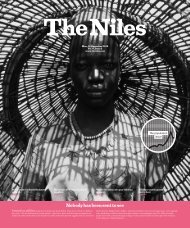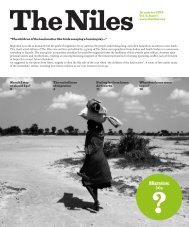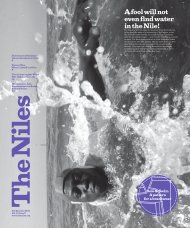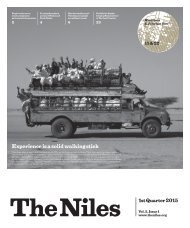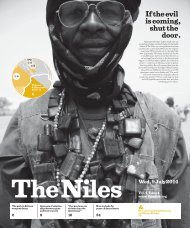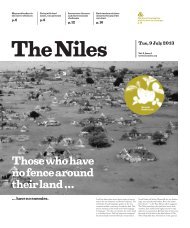Enter houses through their doors...
...suggests an old Sudanese saying. This image, taken five years ago of a man clambering over a fence to view the debut football match of South Sudan’s national team, shows how you can just as easily take an unorthodox route. Over the past five years, both Sudan and South Sudan have taken a few unexpected detours. To mark the five-year anniversary of the separation of the Sudans, The Niles correspondents from both countries have taken a closer look at the paths taken by the neighbouring states. Many developments are sobering, but a few offer scope for hope. In any case, the idiom on the cover of the first print edition of The Niles, published five years ago today, rings truer than ever: It is a fool who rejoices, when the neighbour is in trouble.
...suggests an old Sudanese saying. This image, taken five years ago of a man clambering over a fence to view the debut football match of South Sudan’s national team, shows how you can just as easily take an unorthodox route. Over the past five years, both Sudan and South Sudan have taken a few unexpected detours. To mark the five-year anniversary of the separation of the Sudans, The Niles correspondents from both countries have taken a closer look at the paths taken by the neighbouring states. Many developments are sobering, but a few offer scope for hope. In any case, the idiom on the cover of the first print edition of The Niles, published five years ago today, rings truer than ever: It is a fool who rejoices, when the neighbour is in trouble.
You also want an ePaper? Increase the reach of your titles
YUMPU automatically turns print PDFs into web optimized ePapers that Google loves.
18 The Niles The Niles 19<br />
5 days<br />
reporting<br />
from<br />
Pagak<br />
During the war in December 2014, The Niles<br />
correspondent Fatma Gazali spent five days<br />
covering a Sudan People’s Liberation Movement/<br />
Army in Opposition (SPLM/A-IO) conference<br />
where the rebel organisation weighed up the<br />
pros and cons of war, despite ongoing peace talks.<br />
by Fatma Gazali<br />
Khartoum, Sudan<br />
T<br />
he road to Pagak was far from straight forward. Tensions<br />
were running high as President Salva Kiir Mayardit, Riek Machar<br />
Teny’s rival, was trying to capture the rebel-held area. Pagak<br />
is considered Machar’s second political capital after Nasir, the<br />
stronghold of his movement.<br />
En route I argued with myself about the wisdom and risks<br />
of the trip, envisaging getting caught in clashes. I was only<br />
finally saved from my fear by a great tiredness.<br />
I undertook the journey with some trepidation. I’d heard<br />
stories of the area’s poverty and I knew my reporting would<br />
be hindered by the fact I cannot speak Nuer or the local languages<br />
spoken in the region.<br />
From Gambela to Pagak<br />
On the morning of December 5, 2014, I set off. First I<br />
travelled from Addis Ababa to Gambela, on the border between<br />
South Sudan and Ethiopia, and then on to Pagak. Although<br />
Gambela belongs to Ethiopia, it feels very South Sudanese,<br />
as the majority of its population are members of the Nuer tribe.<br />
The city was a part of a deal during the rule of former<br />
Sudanese President Ibrahim Abboud, in which Sudan gave<br />
Gambela to Ethiopia in return for Kassala.<br />
The road from Gambela to Pagak was lined with tents<br />
of refugees fleeing from violence in South Sudan.<br />
Most opposition leaders heading towards Pagak had already<br />
gathered in Gambela, including Edward Lino, the Sudan<br />
People’s Liberation Movement (SPLM) former security chief.<br />
He is known as one of the most dangerous figures, knowledgable<br />
of the most minute details of SPLM inner workings.<br />
In addition, people attended who were not originally members<br />
of the SPLM, but who joined up with the opposition later.<br />
At 1:00 pm, we left Gambela, guarded by a number of<br />
military personnel amid tight security. The road was not safe,<br />
in fact an attack by the government was very much expected.<br />
After all, thwarting Machar’s conference plans would have gone<br />
down as a big win for the government forces.<br />
Therefore, Machar’s forces were on red alert. Strong military<br />
turnout of the ‘White Army’, loyal to Machar, surrounded Pagak<br />
and the neighbouring villages. In this highly charged atmosphere,<br />
supporters gathered to welcome <strong>their</strong> leaders.<br />
Typical of Sudanese and South Sudanese celebrations, cows<br />
were slaughtered amid singing and dancing. Peace songs were<br />
sung alongside verses praising the Nuer’s courage and pledging<br />
support for <strong>their</strong> leaders.<br />
At 3:00 pm, we entered Pagak where most of the movement’s<br />
leaders and senior representatives, were thoroughly checked.<br />
Most of those accompanying Machar, whether men or women,<br />
were questioned.<br />
Machar’s arrival was a tense affair, not least because the site<br />
was only two hours away from Salva Kiir’s forces.<br />
The area was teeming with heavily-armed people in military<br />
uniforms. Their eyes darted around, full of suspicion and<br />
questions. Although they knew people would travel there from<br />
across South Sudan and abroad, the military mood dominated.<br />
Pagak was no different from any military-ruled area. Soldiers<br />
strolled down the streets and military vehicles homed in on<br />
the town’s market, since such places were often used by spies<br />
to relay <strong>their</strong> findings.<br />
I realised I was not safe to wander aimlessly, so I tried to<br />
stroll accompanied by people speaking the local language, Nuer<br />
in this case.<br />
I moved around between my place of residence at Adventist<br />
Development and Relief Agency, Machar’s house, the market<br />
and the conference headquarters. I was with fellow journalists<br />
and some young members of the SPLM-IO.<br />
Thousands of metres away from Machar’s house, a man<br />
in civilian clothes checked the bags of people heading for the<br />
house. Before we reached the gate, I spotted a number of<br />
Machar’s heavily-armed soldiers.<br />
At the gate, security was boosted even further, overseen<br />
by security people whose faces were more menacing than <strong>their</strong><br />
weapons. <strong>Enter</strong>ing the house was only possible with an appointment,<br />
a good reason, or if you were allowed in by Angelina<br />
Teny, wife of Riek Machar or other members of his office’s staff.<br />
The country’s long culture of war was to blame for the<br />
intense security, as leaders lived under perpetual fear of assassination<br />
attempts. The ghost of war loomed even when there<br />
was no more fighting. Even now, soldiers never feel very far<br />
from the daily life in the bush. Security only eased slightly when<br />
Machar grew tired of it and gave directives to relax controls.<br />
People from the Sudans love to be around <strong>their</strong> leaders<br />
and they exploit any opportunity to meet and talk to them. Machar<br />
was no exception to this trend and spent hours in unofficial<br />
sittings or meeting individuals.<br />
Machar welcomed his visitors warmly, smiling and joking.<br />
Despite the guards, his house was vibrant and full of guests.<br />
It was hard to believe that this was the same man who led “the<br />
Bor Massacre” of 1991, when Nuer fighters loyal to him killed<br />
at least 2,000 civilians from the rival Dinka tribe, of which late<br />
John Garang was a member. Machar apologised for ordering<br />
the massacre in 2011, but the memory of the ‘betrayal’ as Garang<br />
termed it remains large in the minds of the Dinka Bor.<br />
Machar’s wife, Angelina Teny, referred to as Mama<br />
Angelina, is a politician and member of the security committee.<br />
During the conference, she played both the traditional role<br />
of wife, providing food and welcoming guests, and that of<br />
a shrewd politician.<br />
Her strong character helped her operate in a society which<br />
sanctifies men. Her status was clear although some people<br />
objected to the fact she wanted to know the details of everything<br />
communicated to Machar.<br />
She stood against Taban Deng as an independent candidate<br />
in the elections for the Unity State Governor position, despite<br />
that rivalry, she sat next to him during the conference. She<br />
knows that in politics, there is no such thing as a permanent<br />
adversity nor a permanent friendship.<br />
The arrival of a large number of people to a small povertystricken<br />
area such as Pagak, which depends on Ethiopia for<br />
basic imports, shook up local commerce. With the influx of new<br />
faces, the prices of food rose. The cost of a small water bottle<br />
more than doubled from 10 to 25 Ethiopian birr and meal prices<br />
jumped too.<br />
There was only one licensed restaurant owned by an Ethiopian<br />
woman but many town’s people transformed simple strawbuilt<br />
<strong>houses</strong> into restaurants and coffee shops.<br />
People complained that there was high demand on <strong>their</strong><br />
extremely weak services. But the event also boosted the daily<br />
income of the area’s population, with most new arrivals heading<br />
to the market for entertainment or to relieve boredom.<br />
Pagak was clearly a neglected area, lacking basic services<br />
and infrastructure. At the same time it was also highly militarised,<br />
having formed a crossing point in the war against Sudan.<br />
But its history of hosting the armed struggle did not enhance<br />
Pagak’s status in the eyes of the SPLM once the peace agreement<br />
was signed and independence was gained. The harsh living<br />
conditions prevail to this day.<br />
Machar made Pagak, home to a single tribe, the Nuer,<br />
his second capital after Nasir. There locals waited and prepared<br />
for the start of the conference, burning fires all day to provide<br />
reliable meals.<br />
Kabkabi with rice and stock, and rice with fish are the<br />
most common dishes in the area. Those attending the conference<br />
tucked into dates, peanuts and biscuits. Some visitors<br />
complained of the rudimentary conditions: One sole pump<br />
was the main source of water in the settlement which generally<br />
lacks running water and electricity.<br />
Nighttimes were scary as the only light was a weak source<br />
emanating from the headquarters of the African Relief Organisation<br />
which used power generators from 7:00 am to 10:00 pm.<br />
After that, we were plunged into pitch black until dawn.<br />
The best-equipped buildings belonged to non-governmental<br />
organisations and had internet connection for a few minutes<br />
every day. Machar’s house was built of straw. Everyone got used<br />
to the conditions, including those who arrived from Europe,<br />
the United States, Australia, Eastern Africa and Khartoum.<br />
The conference starts<br />
Amid huge military crowds of the SPLA/M-IO and the<br />
White Army, the conference of the armed opposition started<br />
on December 8, 2014. It only kicked off once all the military<br />
rulers and field military leaders arrived, meaning they could<br />
reach a unified position. This was important following rumours<br />
that some military leaders would not participate as they did<br />
not want peace.<br />
These internal divisions delayed the conference for<br />
five days until the last military delegation arrived from the<br />
liberated areas.<br />
Strict security measures were in place around the conference<br />
location, held not far from Machar’s house. Before the conference<br />
started, the White Army held a parade to show it was prepared<br />
to protect the town and the conference participants. The forces<br />
surrounding Pagak were estimated to be 5,000 strong, including<br />
the White Army and the SPLA-IO.<br />
The town’s people turned up in the early morning to prepare<br />
for the conference. Led by clergymen and nuns, they performed<br />
rituals and recitations from the bible, a practice they continued<br />
until the conference got underway.<br />
Among those attending were Machar’s loyalists, representatives<br />
of the Intergovernmental Authority on Development<br />
(IGAD) and some foreigners including me, the only journalist<br />
to attend the conference from beginning to end.<br />
Nuer rituals<br />
The opening session of the five-day conference started with<br />
the national anthem, prayers from the bible, as Christianity is<br />
the majority religion, followed by some verses from the Quran<br />
to indicate respect of Muslims and religious tolerance.<br />
Specific rituals were performed by Nuer women and Nuer<br />
songs were sung. Then the Nuer women dressed Machar,<br />
Alfred Ladu Gore, the movement’s deputy leader who is from<br />
the Murle tribe, and Taban Deng, head of the negotiating team<br />
and the movement’s military head, in traditional outfits. Photos<br />
were taken of the IGAD representatives and the negotiating<br />
team. Fervent music, songs and Nuer poems remained a fixture<br />
<strong>through</strong>out the conference.<br />
Some poems criticised war while others expressed the<br />
Nuer people’s bravery and <strong>their</strong> patience in tough battles. Other<br />
satirical poems criticised injustice, oppression, corruption and<br />
stealing the people’s money. I was keen on knowing the meaning<br />
of all that was said in the Nuer language and pleased there was<br />
simultaneous interpretation into English and Arabic.<br />
There was a long silence before discussions dived into<br />
the conference’s key issues: peace and war, good governance<br />
in South Sudan and uniting the SPLM and the SPLM-IO.<br />
The military leaders sat in the front rows, wearing <strong>their</strong><br />
military ranks on <strong>their</strong> shoulders.<br />
Their postures spoke of arrogance and pride, especially<br />
Lieutenant General Peter Gadet, the harsh fighter from Unity<br />
State. Many praised his speech, saying it was eloquent and<br />
delivered a strong message.<br />
Recalling the start of war<br />
The discussions’ atmosphere was transparent. Machar<br />
did not interrupt any speaker, even if he spoke for an hour.<br />
Those speaking often recalled the tragic events of December<br />
16, 2013 in Juba, the start of the civil war. They violently<br />
criticised Salva Kiir and described the violent acts in Juba<br />
as “genocide”. They said soldiers had targeted members<br />
of the Nuer tribe in Juba. A number of people rejected Kiir<br />
as president.<br />
The Dinka members of Machar’s largely Nuer movement<br />
blamed Salva Kiir and his small group who they said benefitted<br />
from South Sudan’s riches. They pledged to work for Machar’s<br />
revolution and highlighted <strong>their</strong> strong social ties with the<br />
Nuer tribe.<br />
Strong criticism was also fired at Uganda, with speakers<br />
blaming the neighbour state for interfering in the conflict<br />
to exploit South Sudan’s resources. Attendees said it should<br />
withdraw its forces as a first step towards a peace agreement,<br />
adding that Machar, as prime minister, would represent the<br />
whole country not just his Nuer tribe, and would protect<br />
resources from foreign dominance.<br />
The issue of justice and peace was among the international<br />
community’s priorities. Some attendees admitted<br />
that the international community’s policy differed from that<br />
of the movement.<br />
They raised the question: “Should peace or accountability<br />
come first?”<br />
Those at the meeting said peace should come before accountability,<br />
as justice passes <strong>through</strong> the long phases of investigation<br />
and punishment of wrongdoers. They added, however, that<br />
evidence of “Nuer genocides” is irrefutable.<br />
The general opinion of those at the meeting was to create a<br />
federal system by establishing 21 states. As for security, they said<br />
the army, the police and security apparatus should be national<br />
and stressed that all ethnic and tribal considerations should be<br />
removed from all state institutions.<br />
Civil administrations should promote social peace and should<br />
also avoid any tribal and ethnic considerations in politics and<br />
social services.<br />
Among <strong>their</strong> plans for the future, they agreed on employing<br />
people based on <strong>their</strong> qualifications and experience, encouraging<br />
economic growth and investment in agriculture and livestock<br />
and raising awareness of grazers so that the livestock contribute<br />
to the economy.<br />
They said they would exploit the oil income for development,<br />
build infrastructure, including roads, transport system, communications<br />
and would link the cities and rural areas with highways.<br />
There was also talk of establishing projects and dams<br />
to generate power and encouraging the national private sector<br />
to invest and lead development.<br />
They raised<br />
the question:<br />
“Should<br />
peaceor<br />
accountability<br />
come first?”<br />
As time passed, the visions on peace and war crystallised.<br />
In light of this political and military climate, the question in<br />
the air was: Is Pagak the final chapter in the Ngundeng prophecy?<br />
According to the well-known prophesy, a man from the<br />
Nuer tribe will rule South Sudan after its independence and<br />
the outbreak of a major war.<br />
Salva Kiir says this prophecy was one reason why Machar<br />
defected from the movement in 1991. Today, history repeats<br />
itself. Machar waged a war to fulfil the prophecy of ruling South<br />
Sudan after its independence.<br />
After lengthy discussions of the conference issues, the<br />
various committees presented <strong>their</strong> reports. The Chairman<br />
of the Humanitarian Affairs Committee gave an overview<br />
of the suffering underway in the movement’s areas, describing<br />
acute food and medicine shortages, especially in Wad Kuna<br />
on the west bank of the Renk.<br />
He complained that South Sudan’s government is targeting<br />
local civil servants, leading to a shortage of local staff who<br />
represent the link between displaced people and the foreigners<br />
in the international organisations.<br />
The humanitarian situation was dire, he said, not least as<br />
the United Nations planes do not transport those people. He said<br />
there were 292,000 displaced people in Unity State, 275,000<br />
in Upper Nile State and 620,000 in Jonglei State and stressed<br />
that all of those people needed urgent help. Meanwhile, South<br />
Sudanese had fled to Kenya, Ethiopia, Uganda and Sudan.<br />
The health committee, headed by Elizabeth Paul, revealed a<br />
plan to establish health centres in the liberated and border areas<br />
with Sudan, Ethiopia and Kenya. When war started the humanitarian<br />
situation deteriorated sharply in South Sudan, she said.<br />
The financial committee, meanwhile, presented a proposal to<br />
fund the movement’s military activities. It said members should<br />
pay a monthly subscription of 50 U.S. dollars, meaning that total<br />
member subscriptions should reach 1.5 million U.S. dollars<br />
every month. Simple taxes would be imposed on the population<br />
of the liberated areas, the committee suggested.<br />
Meanwhile, the foreign relations committee reported it<br />
had kept positions of some countries in check, in particular,<br />
neutralising China. It had also stopped a weapon cargo<br />
and opened offices for the movement in many countries.<br />
Jiech Mabor, the White Army<br />
On the conference’s fourth day, military leaders revealed<br />
that <strong>their</strong> fighters had entered battles against government forces<br />
in Galachel and Adong in Upper Nile State, south of Malakal<br />
and just six kilometres from Pagak.<br />
Garouth Garkoth, the Military Commander of Upper Nile<br />
State, said his troops had captured three vehicles full of heavy<br />
weapons, adding that Machar’s forces had stopped an attack by<br />
government forces on Nasir. The military leaders said that Kiir’s<br />
forces withdrew from Nasir to Kwat and were on <strong>their</strong> way to<br />
Pagak to strike the conference.<br />
Despite this news, the conference goers were reassured<br />
that Salva Kiir’s forces could not reach Pagak as the Jiech Mabor,<br />
as the Nuers call the White Army, controls its entry points and<br />
the surrounding villages. The White Army has a reputation for<br />
attracting thousands of fighters in a short time.<br />
Showing that the White Army obey the orders of its<br />
leaders, I did not hear any shots or armed clashes during<br />
my time in Pagak.<br />
War and peace<br />
The conference was extended to decide on issues including<br />
peace, good governance and unifying the unifying the armed<br />
opposition movement. It recommended continuing with<br />
the peace negotiations, stressing that war would only add<br />
to the suffering of the South Sudanese people.<br />
Therefore, they called on the international community<br />
to support the IGAD’s efforts. Those at the conference told<br />
the negotiating team to tackle the roots of the crisis, uphold<br />
the rights of the South Sudanese people and achieve the aims<br />
of good governance and the transitional government.<br />
Those attending the gathering decided that Salva Kiir would<br />
remain president for two and a half years until the next elections<br />
if the agreement was signed. They supported punishing those<br />
who committed genocides and crimes against humanity and<br />
deemed that Ugandan forces and those of the Darfuri movements<br />
and the SPLM-North should all be expelled from South Sudan<br />
as soon as possible.<br />
Machar endorsed the conference decisions, including<br />
moving the capital from Juba to Ramciel in Lakes State after<br />
the transitional period. He stressed that <strong>their</strong> revolution would<br />
build a state of democracy, freedom, fair citizenship and stability.<br />
He underlined his focus on education and health.<br />
IGAD’s message<br />
After the conference closed, Machar held independent<br />
meetings with the states’ representatives and South Sudanese<br />
from abroad to discuss issues of organisation and funding.<br />
His meetings lasted from 9:00 pm to 1:00 am.<br />
Machar’s presence in Pagak after the end of the conference<br />
annoyed the IGAD which thought that his additional days were<br />
used to mobilise his troops. The IGAD sent him a message<br />
telling him to go to Addis Ababa.<br />
Back then, both peace and war were options for Machar’s<br />
supporters. Although they were involved in the peace process,<br />
they organised <strong>their</strong> forces and prepared themselves for war.<br />
theniles8_20160704.indd 18-19<br />
2016/7/4 5:13 PM


